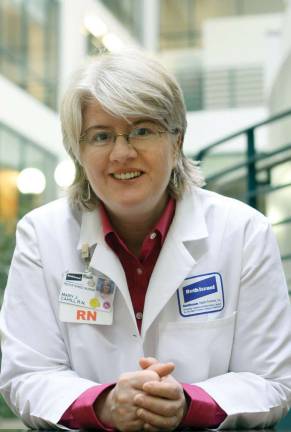2012 OTTY Awards: Handling a Patients Darkest Hour with Compassion and Care

By Ashley Welch One could say that being a nurse is in Mary Cahill's blood. The daughter of a nurse, she has three sisters who also took up the profession. "Being a nurse is not something that is foreign in my family," she said with a laugh. In fact, Cahill, the nursing coordinator at the Appel-Venet Comprehensive Breast Service at Beth Israel, credits her mother for her decision to become a nurse. "I remember her coming home exhausted," she said, "but she always spoke about her day and her patients, and I thought to myself, that's something I would like to one day do." Cahill, 47, has been a nurse for almost 18 years and has held her current position for eight. She said she enjoys her work because she gets to interact so closely with the patients. "I get to see them on a regular basis and really get to know them," she said. Since the patients who come in to the center at Beth Israel are often dealing with serious cases of cancer, she sees them over a period of many months. Since it is an extremely stressful and difficult time in their lives, Cahill said a nurse must possess a great deal of patience, understanding and care. "The job requires a lot of emotional support for the patients," she said. "Oftentimes, when they see the doctor, they are only listening to a small portion of what's being said because they're so nervous and anxious. Afterward, they come to me with all their questions. I also get a lot of phone calls." Acting as a patient liaison, Cahill also discusses surgery and treatment options, schedules visits and surgeries, refers patients to support groups and assesses wounds. She admits that at times, the job can be emotionally taxing. "You see people at their worst," she said. "What's hardest to deal with is when you see someone give up." But Cahill said the other nurses provide a good support system when the job becomes difficult to handle; they are readily available to discuss their emotions and experiences with one another. She feels also must press on to be there for her other patients. "The most rewarding part of the job is when I see someone who has finished treatment," she said. "Usually, a patient comes in nervous and terrified and I see them through the process of getting their life back again. They are so thrilled to be done and are hopeful and appreciative of the guidance and hope I've given them."